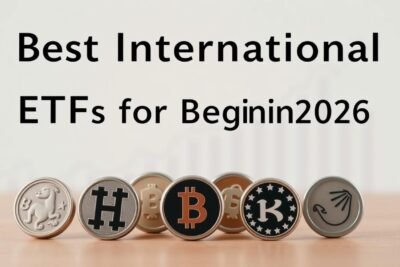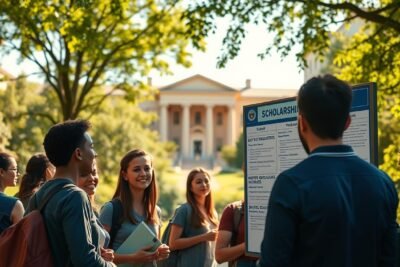
PhD Graduate Scholarships Germany International Students: Apply Now

On a rainy evening in Berlin, you open one convincing email: a host university invites you to discuss a funded research possibility. That small message changes your plan. It shows how focused funding and the right programme can turn an idea into a full research project.
In this guide you get a clear, practical map of the main funding routes and top institutions from DAAD grants and Max Planck schools to institute-linked fellowships. You will learn how to find funding, prepare a strong proposal, and match your research to the right university or institute.
Expect concise information on selection criteria, application timing, and differences between structured programmes and independent routes. For direct programme pages and stipend details, see this useful resource: fully funded merit-based awards.
Learn how to find, apply for, and win top scholarships for 2025–2026 across the US, UK, Canada, and Australia.
Explore Scholarships Guide →- Start here: Your resource hub for PhD funding in Germany
- PhD graduate scholarships Germany international students
- How funding works: grants, duration, and what’s typically covered
- Top funding programmes and research institutions to explore
- DAAD pathways: choosing the right research grant
- Humanities highlight: Gerda Henkel Foundation essentials
- Eligibility and selection: who stands out and why
- Your application toolkit: documents that make the difference
- Letters of recommendation: getting strong, compliant references
- Finding a supervisor and host institution
- International status matters: “Bildungsinländer” vs. “Bildungsausländer”
- Money matters: payments, bank info, and invoices
- Plan your timeline: deadlines, decisions, and start dates
- Next steps: search databases, contact funders, and apply with confidence
Start here: Your resource hub for PhD funding in Germany
Begin your search with a single, reliable hub that lists verified funding options across German research centres. Use national databases and the official pages of funding organisations to gather clear information fast.
Where to look: check DAAD, DLR, Max Planck Society, Leibniz Association, Fraunhofer Society, Marie Skłodowska-Curie networks, Munich Aerospace, and Boehringer Ingelheim Fonds for programme pages and deadlines.
- Compare entries to see supervision models, stipend levels, and university links.
- Bookmark official pages, download guidelines, and save application windows to your calendar.
- Contact programme coordinators early to clarify eligibility and required documents.
| Source type | What it lists | Best for | Action |
|---|---|---|---|
| National databases | Consolidated funding information | Quick comparison | Filter by discipline and deadline |
| Organisation websites | Official programme pages | Detailed rules & contact | Download guidelines, email coordinators |
| University portals | Project listings and supervisors | Finding hosts and support | Reach out to researchers early |
PhD graduate scholarships Germany international students
A strong research culture and abundant institutes make this an ideal place to launch your doctoral project.
Why this choice works for you: you plug into a dense ecosystem of world-class institutions where projects span basic science to applied work. Max Planck, Leibniz, Fraunhofer, and DLR institutes host many active labs and collaborative centres that boost visibility and impact.
Structured programme or individual route?
Structured phd programme paths like IMPRS and Research Training Groups give cohort training, transferable skills, and a defined curriculum. That model suits you if you value peer learning and regular checkpoints.
An individual doctorate fits if you want one-to-one supervision and freedom to shape the topic alongside a faculty chair or external institute. Many programmes offer English tracks and explicit funding for both formats.
- You benefit from robust supervision, advisory committees, and advanced facilities.
- You can match your working style: scaffolding and cohorts, or autonomy and direct mentorship.
- Look into targeted funding and programme pages for example, see a helpful guide to fully funded options here.
How funding works: grants, duration, and what’s typically covered
Funding packages vary widely; understanding what a grant will actually pay for saves time and stress. Read award rules early so you can map timelines, required reports, and renewal conditions to your research milestones and degree plan.
Monthly stipends, travel support, and family grants
Monthly stipends usually cover living costs. Some organisations allow travel and material expenses, but they need prior approval and detailed cost lists.
You may qualify for a family grant for children under a certain age. Foundations like Gerda Henkel explicitly offer child support for stipend holders on doctoral or research projects.
Insurance, tuition, and what’s not funded
Most awards do not pay tuition or national insurance contributions. Plan to arrange medical insurance yourself; premiums are typically not reimbursed.
Many programmes forbid simultaneous salary or pension receipts with a scholarship. You can request an overseas bonus for research trips over four weeks, but accommodation during that time is often not covered.
- Keep original receipts and copies; universities may require originals for up to ten years.
- Check standard funding duration and renewal rules, and align your workplan to those dates.
- Individual conference trips are rarely covered unless part of a larger funded project.
"Travel and material costs require detailed invoicing and prior approval to qualify for reimbursement."
Top funding programmes and research institutions to explore
If you want targeted support, start by mapping programmes that match your research topic and timeline.
DAAD offers Research Grants for full doctoral projects and One-Year Grants to help you collect data or refine methods. These grants are a common entry point when you need standalone funding.
Collaborative Research Centres and Research Training Groups create cohort-based settings. They give structured training, regular checkpoints, and strong supervision for topic-focused projects.
- IMPRS and Max Planck Schools deliver fully funded tracks with top facilities and interdisciplinary mentoring.
- Fraunhofer, Leibniz, and Max Planck institutes host institute-embedded projects linked to state research priorities.
- DLR-DAAD Fellowships, Munich Aerospace, and Marie Skłodowska-Curie Networks add specialised routes for aerospace, energy, and mobility topics.
- Green pathways such as ERA Fellowships - Green Hydrogen and the Green Talents scheme build sustainability credentials and networks.
"Target a small set of programmes and institutions that fit your timeline and methods."
DAAD pathways: choosing the right research grant
DAAD funding opens several clear pathways to support a focused research phase or a full doctoral programme. Pick the route that matches your timeline, supervision plan, and host type.
Doctoral Programmes in Germany (individual or structured)
You can use DAAD Research Grants to fund either a structured programme or an individual doctorate at a state or state-recognised university or research institute.
Structured tracks give cohort training and routine checks. Individual paths offer one-to-one supervision and topic flexibility.
Bi-nationally supervised doctorates/Cotutelle
You can pursue a bi-nationally supervised doctorate (Cotutelle) to complete a degree at your home university while doing key research phases in Germany. This keeps your home degree pathway intact and adds strong international research experience.
- Apply for One-Year Grants to fund a discrete phase: fieldwork, experiments, or archives.
- Verify the host is state or state-recognised to meet DAAD eligibility rules.
- Align your proposal and supervisor confirmations with the DAAD pathway you select.
- Combine DAAD support with graduate schools, mentors, and the alumni network to strengthen career options.
"Match grant type to your supervision model and documented research plan."
Humanities highlight: Gerda Henkel Foundation essentials
If your work sits at the intersection of archives and narrative, the Gerda Henkel Foundation is a key funder to consider. It backs historical humanities projects and accepts proposals in German or English, with a preference for German.

Eligible fields, language and document standards
You are eligible when your proposal fits historical humanities and follows the foundation’s format rules.
Keep the project description to a maximum of eight pages, use at least 11-point font and 1.5 line spacing. Include method, state of research, sources, and relevance.
Grade threshold, age rule and permitted work
The foundation requires a minimum master grade of 1.5 (German) or an A equivalent. The age rule relates to the date you obtained your degree, but recognised exceptions apply for night school, children, or service.
You may work an average of up to five hours per week, but you cannot combine the award with a salary or a pension.
Expenses, bonuses and printing aid
Travel and material expenses need a detailed cost list. An overseas bonus is available for stays longer than four weeks; note that accommodation in that period is not covered.
Printing aid is possible only for Gerda Henkel-funded projects and budgets are limited. Tuition fees are not covered, and you must arrange your own medical insurance.
- Family grant available for children under 18 to support parenting while you do research.
- Letters recommendation must be uploaded via the online recommendation form and bear a personal signature.
- Decisions usually take about six months once your documents are complete.
"Prepare a focused, method-led exposé and clear cost breakdowns to speed the decision process."
Eligibility and selection: who stands out and why
Knowing who funding panels favor lets you tailor your dossier from day one. Panels look for clear proof of a qualifying degree, a feasible plan, and solid supervision. Formal registration at a university is not always required at first.
Prepare to wait: most review periods last three to six months. Committees often do not share exact meeting dates or full reasons for refusals. If you miss a slot, reapply with updated files and a stronger case.
How to stand out
- Submit official degree transcripts and a verification letter early.
- Show methodological rigor and realistic milestones for your research.
- Include confirmation of supervision to prove feasibility to reviewers.
- Follow the submission order and format rules without exception.
| Requirement | Common rule | Practical tip |
|---|---|---|
| Proof of degree | Official transcripts or certified copies | Upload early to avoid delays |
| Registration | Often not required at application | Clarify later with the host university |
| Selection timeline | 3–6 months typical | Plan start dates and travel accordingly |
| Reapplication | Allowed if you submit full documents | Revise proposal and add new references |
| Committee feedback | Limited disclosure | Strengthen profile rather than seek reasons |
"Focus on feasibility, method, and clear supervision to make your application stand out."
Your application toolkit: documents that make the difference
Build a compact dossier that tells a clear story about your motivation, skills, and planned research. Committees scan for clarity, feasibility, and fit.

Statement of purpose
Use the statement to show why you want a doctorate, what strengths you bring, and how the scholarship and programme match your goals. Be specific about career aims and relevant experience.
Research proposal / exposé
Prepare a concise exposé of 5–12 pages. Define core questions, goals, and the current state of research in your field.
Describe your methodology and list any preliminary results to show momentum. Discuss the exposé with your supervisor and follow good scientific practice.
Work plan and timetable
Include a realistic plan with milestones that show the project can finish within two to three years. Break tasks into months or quarters and link them to expected outputs.
- Tailor each document to the programme’s rules and formatting.
- Keep version control and track updates so referees see the latest information.
- Ask your supervisor for feedback before submission.
"Make it easy for reviewers: clear aims, precise method, and a credible timetable."
For guidance on finding a host and supervision, see phd host guidance.
Letters of recommendation: getting strong, compliant references
Treat your referees as partners: brief them early and give precise guidance. Good letters recommendation show fit, feasibility, and concrete evidence of your work.
Who to ask and what to include
Ask your future supervisor for the first letter and a second university instructor who knows your academic record. Provide your CV, transcripts, exposé, and key publications so referees can cite specifics.
How to submit and language rules
Follow submission steps exactly. Many programmes need letters sent directly by authors. Some funders require upload via an online recommendation form with a personal signature (for example, Gerda Henkel).
You may send letters in German or English. You can use referees from abroad if they know your work well. Brief them on panel criteria so they address originality and fit.
"A focused, evidence-based reference speeds review and improves chances."
- Coordinate deadlines early to avoid delays for candidates.
- Confirm receipt through the portal or coordinator.
- For a practical format, share a linked letter template: letter template.
Finding a supervisor and host institution
Start by mapping a short list of potential supervisors whose recent work overlaps with your methods and data. A targeted approach saves time and shows respect for the host’s agenda.

Approaching professors and junior group leaders
Contact professors and junior research group leaders with a concise email, a CV, and a one-page project sketch. Keep the message sharp: state your topic, key methods, and a suggested fit with their lab.
Ask about supervision style, meeting frequency, and publication expectations before you commit.
Structured programmes vs independent projects
You can apply for advertised positions that combine research work with enrollment. These posts often sit within funded projects at a university or institute. Alternatively, apply to structured programmes with cohorts and training, or propose an independent doctoral project if you need more freedom.
- Show how your doctoral project adds value to ongoing projects or strategic themes.
- Propose collaboration angles, methods, or datasets that match the lab’s focus.
- Use directories like IMPRS and Research Training Groups to find research institutions and openings.
Secure a preliminary supervision agreement or letter of intent early, as many funding calls require it. For central listings of funded host postings, check this DAAD database: funded host listings.
"A short, well-referenced proposal wins attention more than a long, vague email."
International status matters: “Bildungsinländer” vs. “Bildungsausländer”
Your school records and where you earned them can change how a funder treats your application.
Bildungsinländer means you gained your university entrance qualification in Germany or at a German school abroad. Otherwise, you are classed as a Bildungsausländer. This label affects required documents and some eligibility rules.
Check where your final school certificate was issued. Then read the programme's website and application notes for category-specific rules.
- Verify your status early to avoid delays in the selection process.
- Contact the programme coordinator if you have mixed schooling or unusual records.
- Keep official translations of school documents ready if they are not in German or English.
| Category | Where qualification was earned | Common extra documents | Typical impact |
|---|---|---|---|
| Bildungsinländer | Germany or German schools abroad | Standard degree and transcripts | Simpler verification, standard quotas |
| Bildungsausländer | Non-German school systems | Credential evaluation, certified translations | May face different selection rules or quotas |
Align your proof of degree and school records with what the funder expects. Use authoritative sources and the funder’s website for final information before you prepare your file.
Money matters: payments, bank info, and invoices
Timely transfers start with one simple step provide correct IBAN and BIC without delay. After you accept an award, confirm acceptance quickly and send your bank details so the first payment is not held up.
IBAN/BIC, SEPA transfers, and overseas accounts
You should send your IBAN and BIC for SEPA transfers promptly after accepting the award. Grants normally use SEPA, and a German account often speeds processing.
You can receive transfers to an overseas account if needed, but some funders prefer a local account for smoother state payouts.
Original receipts, family travel, and allowable costs
Keep original receipts for reimbursements. If a university office keeps originals, preserve certified copies for audits for up to ten years.
Track allowable costs precisely and avoid using grant money for items not listed in your approval. Many funders do not reimburse family travel, so plan personal trips from your own budget.
- Arrange your own medical insurance; providers rarely cover insurance contributions.
- Inform the funder if your paid work averages over five hours per week prior agreement is required.
- Follow the funder’s invoicing order and documentation rules. Check the programme website or ask the coordinator for any unclear information.
"Submit bank details and keep clear records to avoid payment delays and audit issues."
Plan your timeline: deadlines, decisions, and start dates
A clear timeline turns long selection waits into manageable planning steps you can act on.
Application processes vary: some funders use fixed deadlines, others accept rolling submissions. Map both types early so you have time for referee letters, host confirmations, and document checks.
When to apply and typical 3–6 month selection periods
Expect a typical selection duration of three to six months. Build that window into your overall plan for relocation, visa processing, and project setup.
Tip: set internal deadlines for drafts, referee reminders, and transcript requests so you don’t rush at the end.
Accepting grants, start windows, and registration timing
When an offer arrives, accept in writing by the deadline. Submit bank details (IBAN/BIC) and state your preferred payment start month to trigger transfers.
Some foundations require you to begin your doctorate within a defined window for example, within twelve months of the grant agreement. Coordinate your programme registration to align enrollment, supervision, and payments.
- Map calls with fixed deadlines and rolling opportunities on one calendar.
- Stage your research ramp-up: literature review, ethics/IRB, and pilot work before funds begin.
- Plan contingencies if decisions land near the end of a visa or housing window.
"You should treat selection timelines as part of your project plan not separate from it."
For intake dates and help syncing start windows with local timelines, see this intake guide: intake schedules and tips.
Next steps: search databases, contact funders, and apply with confidence
Make a practical to-do now: shortlist authoritative funding organisations and bookmark their official pages so you always use current information. Use the DAAD database for verified listings: DAAD database, and consult a finance resource like this finance scholarships guide for budgeting tips.
Email programme officers early to check eligibility and get clarifications. Prepare several tailored applications in parallel and ask researchers for quick feedback on your exposé and letters.
Show clear methods, realistic milestones, and fit with state research priorities. That practical clarity reassures reviewers and boosts your chances of support for the doctorate.
Looking for Scholarships in 2026?
Explore our complete collection of top scholarships for international students across the USA, UK, Canada, Australia, and Europe.






Leave a Reply